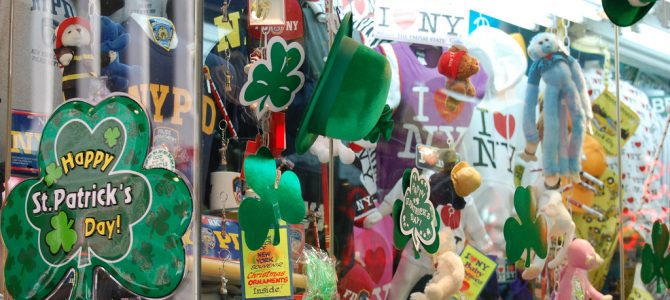
I am the product of an intermarriage: my mother Irish Catholic, my father Eastern European Jewish. Per the divorce agreement, I was allowed to choose my own religious path. At six years old, my mother told me about Judaism: Jews were “people of the book” and the soup she made a few times a year (matzo ball) was Jewish.
I was sold. By choosing my father’s religion, I was also partly choosing his culture. I much preferred what I saw out of my Jewish heritage than that of my Irish.
My maternal grandmother never understood it. Why would I choose a faith where its adherents have been despised through the ages just because of books and soup? My response, without fail, included a diatribe against Saint Patrick’s Day.
Compare my two heritages: What is the most famous Jewish holiday? According to an extraordinarily scientific poll of my Twitter followers, it is Hanukkah. The story of Hanukkah is of heroism, miracles, and the can-do spirit of the Jewish people to survive in the face of extraordinary odds. That’s basically the theme of most Jewish holidays. As my mother used to say, “They tried to kill the Jews. They didn’t succeed. And then you eat.”
The most famous holiday on my mother’s side, in contrast, features green beer, public intoxication, forced affection from strangers (“Kiss me, I’m Irish!”) and a customary meal that smells, well, I’ll say it smells unpleasant. Despite my mother making a big pot of corned beef and cabbage every year for St. Patrick’s Day, I refused to partake, citing my hatred of my Irish heritage and the generally foul smell emanating from that half of the house.
Things Began to Change In Dublin
It wasn’t until the year after I graduated from college that my hatred of my Irish heritage dulled. One of my best friends from my college years, Dave, was about to experience a milestone over Thanksgiving weekend.
We were the founding members of the “DMDC,” as we affectionately titled it: The Dead Moms and Dads Club. We had both had the unfortunate experience of burying both of our parents in our teens, but fortunately, we found in each other kindred spirits who dealt with grief in the same way: with a determination to rise above our circumstances and a deeply dark sense of humor.
This milestone of Dave’s was a big one: It was his first major holiday and birthday since the death of his mother. We decided to get out of the country and drink our way through the weekend. Naturally, we flew to Dublin.
I discovered something in the many, many pubs we visited over the course of that long weekend. Irish folks weren’t the fall-down drunks I saw on the streets of New York City every March 17. Sure, they’d sit around and enjoy a few pints, but public urination wasn’t an inevitable cap on the evening, as it is in the United States on St. Patrick’s Day weekend.
Americans Ruined Saint Patrick’s Day, Not the Irish
Upon returning home, I discovered the version of St. Patrick’s Day Americans are familiar with is a purely American invention. The first parade took place in New York City, and up until the 1960s, pubs in Ireland were closed on the day, which was treated as a solemn affair, not an excuse to get blackout drunk. It was Americans (more precisely: New Yorkers) who ruined the day, not the Irish.
These days in my house, St. Patrick’s Day is back on the calendar, thanks to a Jewish husband more enthusiastic about his kids’ Irish heritage than is normal and my two redheaded children, one of whom was born at almost high noon on St. Patrick’s Day. My mother, ever the jokester even in the Great Beyond, must have arranged his birth to ensure my return to celebrating the day.
Thanks to a baby meal delivered by a local family with the same cultural mix of Irish and Jewish, I even had my first experience with corned beef and cabbage the week he was born. My sister-in-law decorated the tables at his bris the next week with shamrocks and leprechauns, a playful nod to both sides of his heritage.
In becoming a mother, I’ve completed the inevitable circle of life and became my own mother. Now, if only I could ensure my kids celebrate St. Patrick’s Day in Ireland instead of America every year.









